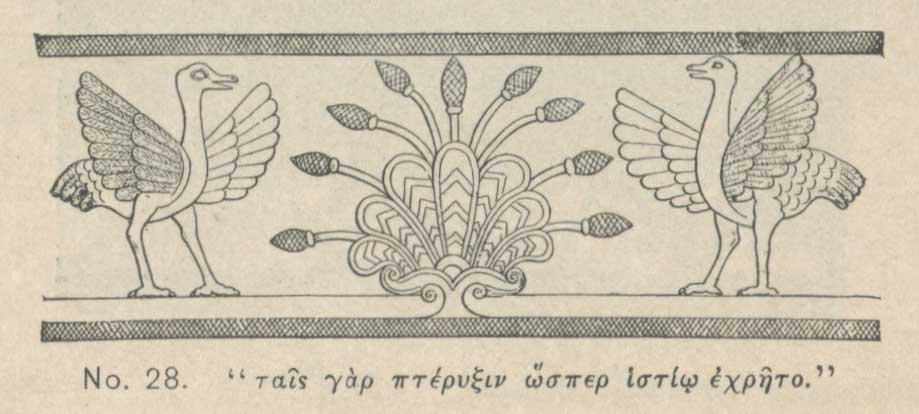THE FIRST GREEK BOOK
BY JOHN WILLIAMS WHITE, PH.D, LL.D., LITT.D.
Professor Of Ancient Greek At Harvard University
This Revision Copyright ©2012 by Shawn Irwin
Lesson XL - Optative Middle and Passive. Optative after Verbs of Fearing
S378. Learn the conjugation of the optative middle and passive of λύω
in 765 (λῡοίμην), 766 (λῡσοίμην), 767 (λῡσαίμην),
769 (λελυμένος εἴην and λελῡσοίμην), and 770 (λυθείην and λυθησοίμην).
S379. The mood suffix is , as in the active (362), except in the aorist passive; here it is
ιη in the singular and sometimes in the dual and plural, but the shorter forms
λυθείτον, λυθείτην, etc., occur more frequently. In these forms the accent does not go
back of the mood suffix. The optative middle and passive uses the middle and passive secondary endings (175),
except in the aorist passive, where the active endings occur (145).
S380.
1. ἔδεισα μὴ τὰς γεφύρᾱς λύοιεν, I feared that they would destroy the bridges.
2. ἐδείσαμεν μὴ οὐ πιστοὶ εἶτε, we feared that you would not be faithful.
The verb which denotes fear is here in a secondary tense (compare 333), and the subordinate clause takes the optative.
S381. After verbs denoting fear, caution, or danger, μή, that or lest,
takes the optative after secondary tenses. The negative form is μὴ οὐ.
S382. VOCABULARY.
εἴσω, (compare εἰς), adverb, inside, within.
ἑκατέρωθεν, adverb, on both sides or flanks.
εὐνοικῶς, (compare εὔνους), adverb, with good will, kindly.
ἐχθρός, ά, όν, hostile; ἐχθρός, ο, as noun, enemy, joe.
κύκλος, ου, ὁ, circle, curve.
κυκλόω, κυκλώσω, etc., encircle, hem in.
ὅμως, adverb, nevertheless, yet, still, however.
πλησιάζω (πησιαδ), πλησιάσω, etc., approach.
στερέω, στερήσω, etc., deprive, rob, bereave.
σῴζω (σω, σωδ), σώσω, ἔσωσα, σέσωκα, σέσωμαι and σέσωσμαι, ἐσώθην,
save, rescue, keep safe; middle and passive, save oneself, be saved alive, return safely.
σῶμα, ατος, τό, body, life, person.
S383.
1. ἔδεισε μὴ οἱ ἐχθροὶ τῑμηθεῖεν.
2. εἰ οἱ Ἕλληνες πλησιάζοιεν, φοβηθεῖεν ἂν οἱ πολέμιοι.
3. Ξενοφῶντα ἄρχοντα ἐποιησάμεθα ἵνα σωθεῖμεν.
4. εὐνοικῶς ἂν ἔχοι τοῖς Ἕλλησιν ὁ Κῦρος, εἰ ψηφίσαιντο συμπορεύεσθαι.
be well disposed. ἔχω is used with an adverb in the sense of
εἰμι with an adjective. Ξφ. καλωςἐχει in 308.
5. εἰ ὅπλα μὴ ἔχοιμεν, καὶ τῶν σωμάτων στερηθεῖμεν ἂν.
Verbs of depriving may take a genitive of the thing. compare 838. This is the genitive of separation (849).
6. εἰ δὲ πιεζοίμεθα ὑπο τῶν πολεμίων, πορευοίμεθαἀν κύκλῳ.
Dative of manner (866).
7. οἱ δὲ στρατιῶται ἔδεισαν μὴ καταλειφθείησαν.
8. εἰ νικήσαιμεν, καὶ (both) σῳζοίμεθα ἂν καὶ τὰ ἐπιτήδεια ἂν ἔχοιμεν.
9. ἀλλ᾽ ὅμως ὁ στρατηγὸς ἐφοβήθη μη κυκλωθείη ἑκατέρωθεν.
10. παρεκάλουν τοὺς ἄνδρας εἴσω ὅπῶς αὐτοῖς συμβουλευοίμην τί δίκαιον ἐστι καὶ πρὸς θεῶν καὶ πρὸς ἀνθρώπων.

S384.
1. I feared that the bridge would be destroyed.
2. There was danger that the barbarians might try to withdraw during the night.
Use the aorist.
3. He was afraid that the enemy would not cease from war.
4. I would not take part in the expedition, unless Xenophon were present.
S385. The Soldiers go hunting.
οἱ γὰρ ὄνοι, ἐπεὶ οἱ στρατιῶται ἐδίωκον, προέτρεχον˙
καὶ πάλιν, ἐπεὶ ἐπλησίαζον οἱ ἵπποι, ταυτὸ ἐποίουν, καὶ
οὐκ ἦν λαμβάνειν εἰ μὴ οἱ στρατιῶται διετάττοντο.
στρουθὸν δὲ οὐδεὶς (nobody) ἔλαβεν. ταῖς γὰρ πτέρυξιν
ὥσπερ ἱστίῳ ἐχρῆτο, καὶ οἱ διώκοντες ταχὺ ἐπαύοντο.
τὰς δὲ ὠτίδας, εἴ τίς ταχὺ διώκει, ἔστι λαμβάνειν˙
πέτονται γὰρ βραχὺ καὶ ταχὺ απαγορεύουσι.
ἦν: was possible. compare ἐστι in 6.
διετάττοντο: posted themselves at intervals, and thus took up the chase in succession.
ἔλαβε: second aorist of λαμβανω.
πτερυξεν: χραομαι takes the dative. compare 309, 1.
ἐχρῆτο: irregular contraction for ἐχρᾶτο.
βραχὺ: a short distance.

See the route on the map.
End Of Chapter
INDEX
Chapter 41
HOME
This Revision Copyright ©2012 by Shawn Irwin

